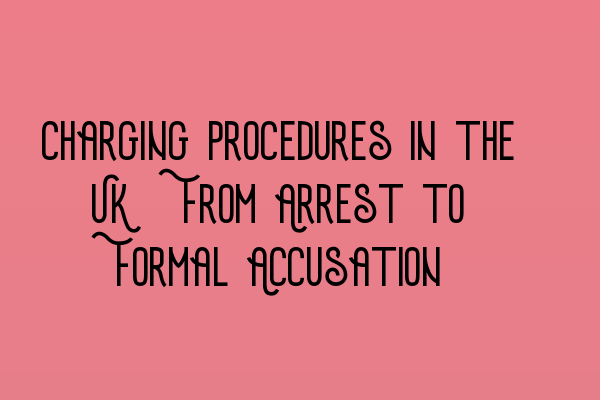Charging Procedures in the UK: From Arrest to Formal Accusation
When it comes to criminal law, understanding the charging procedures in the UK is crucial. From the moment of arrest to the formal accusation, each step in the process plays a vital role in ensuring justice is served. In this blog post, we will explore the various stages of the charging procedures, providing insights into the legal framework and the rights of individuals involved.
The Arrest Process
The first step in the charging procedure is the arrest. When a person is suspected of committing a crime, the police have the power to arrest them. This is typically done with the aim of gathering evidence and preventing further harm. However, an arrest does not equate to guilt, as everyone is entitled to the presumption of innocence until proven guilty.
After the arrest, the individual is taken to the police station to be processed. Here, they may undergo various procedures, such as the recording of personal details, fingerprints, and photographs. It is essential for the police to follow proper procedures during this stage to protect the rights of the accused.
Once the initial processing is complete, the police may decide to release the individual on bail or retain them in custody for further questioning and investigation. This decision is made based on factors such as the seriousness of the alleged offense, the likelihood of the person fleeing, and the potential risk they pose to the public. In cases where a suspect is still in custody, the police must bring them before a court within a specified timeframe set by legislation.
The Role of the Crown Prosecution Service (CPS)
When it comes to formal accusations, the Crown Prosecution Service (CPS) plays a significant role. The CPS is responsible for reviewing the evidence gathered by the police and making a decision on whether to charge the suspect. Their primary consideration is the likelihood of securing a conviction based on the available evidence.
If the CPS determines that there is sufficient evidence, they will bring formal charges against the suspect. This is done by issuing a document known as an indictment, which outlines the specific offenses the individual is accused of committing. The indictment is then served to the accused, marking the official start of the trial process.
Pre-Trial and Trial Procedures
In the pre-trial stage, the defense and prosecution teams engage in the process of disclosure, where they exchange relevant evidence. This ensures that both sides have access to the information necessary for a fair trial. It is vital for the defense team to carefully review the evidence against their client, identifying any weaknesses or potential defenses that could be raised during the trial.
The trial itself is conducted in a court of law and involves presenting evidence, examining witnesses, and making legal arguments. The prosecution must prove the guilt of the accused beyond a reasonable doubt, while the defense seeks to cast doubt on the prosecution’s case. The judge or jury then deliberates and delivers a verdict based on the evidence presented.
Conclusion
The charging procedures in the UK, from arrest to formal accusation, form the backbone of the criminal justice system. It is essential for individuals facing criminal charges to understand their rights and the processes involved. By seeking legal representation and understanding the various stages of the charging procedures, individuals can navigate through the criminal justice system more effectively.
For further information on criminal law and practice in the UK, explore our related articles:
- SQE 1 Practice Exam Questions
- SQE 1 Practice Mocks FLK1 FLK2
- SQE 2 Preparation Courses
- SQE 1 Preparation Courses
- SRA SQE Exam Dates
